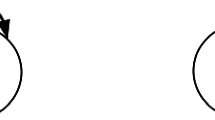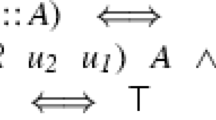Abstract
We propose a relaxation to the definition of a well-structured transition systems (WSTS) while retaining the decidability of boundedness and termination. In this class, we ease the well-quasi-ordered (wqo) condition to be applicable only between states that are reachable one from another. Furthermore, we also relax the monotony condition in the same way. While this retains the decidability of termination and boundedness, it appears that the coverability problem is undecidable. To this end, we define a new notion of monotony, called cover-monotony, which is strictly more general than the usual monotony and still allows to decide a restricted form of the coverability problem.
Access this chapter
Tax calculation will be finalised at checkout
Purchases are for personal use only
Similar content being viewed by others
References
Abdulla, P.A., Cerans, K., Jonsson, B., Tsay, Y.: Algorithmic analysis of programs with well quasi-ordered domains. Inf. Comput. 160(1-2), 109–127 (2000). https://doi.org/10.1006/inco.1999.2843
Blondin, M., Finkel, A., McKenzie, P.: Handling infinitely branching WSTS. In: Esparza, J., Fraigniaud, P., Husfeldt, T., Koutsoupias, E. (eds.) ICALP 2014. LNCS, vol. 8573, pp. 13–25. Springer, Heidelberg (2014). https://doi.org/10.1007/978-3-662-43951-7_2
Blondin, M., Finkel, A., McKenzie, P.: Well behaved transition systems. Log. Methods Comput. Sci. 13(3) (2017). https://doi.org/10.23638/LMCS-13(3:24)2017
Bollig, B., Finkel, A., Suresh, A.: Bounded reachability problems are decidable in FIFO machines. In: Konnov, I., Kovács, L. (eds.) 31st International Conference on Concurrency Theory, CONCUR 2020, September 1–4, 2020, Vienna, Austria (Virtual Conference). LIPIcs, vol. 171, pp. 49:1–49:17. Schloss Dagstuhl - Leibniz-Zentrum für Informatik (2020). https://doi.org/10.4230/LIPIcs.CONCUR.2020.49
Chadha, R., Viswanathan, M.: Deciding branching time properties for asynchronous programs. Theor. Comput. Sci. 410(42), 4169–4179 (2009). https://doi.org/10.1016/j.tcs.2009.01.021
Dickson, L.E.: Finiteness of the odd perfect and primitive abundant numbers with n distinct prime factors. Am. J. Math. 35(4), 413–422 (1913)
D’Osualdo, E., Stutz, F.: Decidable inductive invariants for verification of cryptographic protocols with unbounded sessions. In: Konnov, I., Kovács, L. (eds.) 31st International Conference on Concurrency Theory, CONCUR 2020, September 1–4, 2020, Vienna, Austria (Virtual Conference). LIPIcs, vol. 171, pp. 31:1–31:23. Schloss Dagstuhl - Leibniz-Zentrum für Informatik (2020). https://doi.org/10.4230/LIPIcs.CONCUR.2020.31
Dufourd, C., Finkel, A., Schnoebelen, P.: Reset nets between decidability and undecidability. In: Larsen, K.G., Skyum, S., Winskel, G. (eds.) ICALP 1998. LNCS, vol. 1443, pp. 103–115. Springer, Heidelberg (1998). https://doi.org/10.1007/BFb0055044
Erdős, P., Rado, R.: A partition calculus in set theory. Bull. Amer. Math. Soc. 62(5), 427–489 (1956)
Finkel, A.: Reduction and covering of infinite reachability trees. Inf. Comput. 89(2), 144–179 (1990). https://doi.org/10.1016/0890-5401(90)90009-7
Finkel, A., McKenzie, P., Picaronny, C.: A well-structured framework for analysing petri net extensions. Inf. Comput. 195(1-2), 1–29 (2004). https://doi.org/10.1016/j.ic.2004.01.005, http://www.lsv.ens-cachan.fr/Publis/PAPERS/PS/FMP-wstsPN-icomp.ps
Finkel, A., Praveen, M.: Verification of flat fifo systems. In: Fokkink, W., van Glabbeek, R. (eds.) Proceedings of the 30th International Conference on Concurrency Theory (CONCUR 2019), Leibniz International Proceedings in Informatics, Leibniz-Zentrum für Informatik, Amsterdam, The Netherlands, August 2019
Finkel, A., Schnoebelen, P.: Well-structured transition systems everywhere! Theor. Comput. Sci. 256(1–2), 63–92 (2001). https://doi.org/10.1016/S0304-3975(00)00102-X
Higman, G.: Ordering by divisibility in abstract algebras. In: Proceedings of The London Mathematical Society, pp. 326–336 (1952)
Jéron, T., Jard, C.: Testing for unboundedness of fifo channels. Theor. Comput. Sci. 113, 93–117 (1993)
Acknowledgements
The work reported was carried out in the framework of ReLaX, UMI2000 (ENS Paris-Saclay, CNRS, Univ. Bordeaux, CMI, IMSc). It is partly supported by ANR FREDDA (ANR-17-CE40-0013) and ANR BRAVAS (ANR-17-CE40-0028).
Author information
Authors and Affiliations
Corresponding author
Editor information
Editors and Affiliations
Rights and permissions
Copyright information
© 2022 IFIP International Federation for Information Processing
About this paper
Cite this paper
Bollig, B., Finkel, A., Suresh, A. (2022). Branch-Well-Structured Transition Systems and Extensions. In: Mousavi, M.R., Philippou, A. (eds) Formal Techniques for Distributed Objects, Components, and Systems. FORTE 2022. Lecture Notes in Computer Science, vol 13273. Springer, Cham. https://doi.org/10.1007/978-3-031-08679-3_4
Download citation
DOI: https://doi.org/10.1007/978-3-031-08679-3_4
Published:
Publisher Name: Springer, Cham
Print ISBN: 978-3-031-08678-6
Online ISBN: 978-3-031-08679-3
eBook Packages: Computer ScienceComputer Science (R0)





